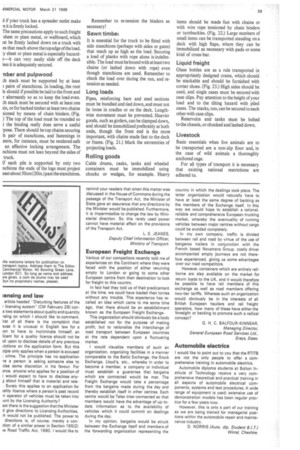:ensing and law
Page 61

If you've noticed an error in this article please click here to report it so we can fix it.
article headed "Disturbing features of the f licensing system" (CM February 28) cons two statements about quality and quantity lsing on which I should like to comment. irst of all there is the complaint that use it is unusual in English law for a on to have to incriminate himself, an licant for a quality licence should not be ml upon to disclose details of any previous Actions on the application form. But this ciple only applies when a person is accused
crime. The principle has no application re a person is asking someone else to cise some discretion in his favour. For 3nce, anyone who applies for a position of : would expect to have to disclose any about himself that is material and rele. Surely this applies to an application for iality licence where a person's past record n operator of vehicles must be taken into iunt by the Licensing Authority?
ext there is the suggestion that the Minister d give directions to Licensing Authorities, :h would not be published. The power to directions is, of course, merely a conition of a similar power in Section 165(2) le Road Traffic Act, 1960. I would like to
remind your readers that when this matter was discussed in the House of Commons during the passage of the Transport Act, the Minister of State gave an assurance that any directions by the Minister would be published. Furthermore, it is impermissible to change the law by Ministerial direction. So this rarely used power cannot have material effect on the provisions of the Transport Act.
L. E. JEANES, Deputy Chief Information Officer, Ministry of Transport.
European Freight Exchange
Various of our competitors recently told me of experiences on the Continent where they were faced with the position of either returning empty to London or going to some other European centre from their destination to look for freight to this country.
In fact had they told us of their predicament at the time, we could have loaded their lorries without any trouble. This experience has recalled an idea which came to me some time ago, that there should be an establishment known as the European Freight Exchange.
This organization should obviously be a body established not for the purpose of making profit, but to rationalize the interchange of road transport between European countries at the rate dependent upon a fluctuating market.
I would visualize members of such an organization, organizing facilities in a manner comparable to the Baltic Exchange, the Stock Exchange, Lloyd's, etc., whereby in order to become a member, a company or individual must establish a guarantee that bargains which are contracted would be met. The Freight Exchange would take a percentage from the bargains made during the day and thereby establish itself in other centres. Each centre would be Telex inter-connected so that members would have the advantage of up-todate information as to the availability of vehicles which it could commit on dealings during the day.
In my opinion, bargains would be struck between the Exchange itself and members of the forwarding organization representing the country in which the dealings took place. The latter organization would naturally have to have at least the same degree of backing as the members of the Exchange itself. In this way we would hope to establish a rational, reliable and comprehensive European trucking market, whereby the eventuality of running vehicles between major centres without cargo could be avoided completely.
In my own company, traffic is divided between rail and road by virtue of the use of kangaroo trailers in conjunction with the French based Novatrans Group, costly driver accompanied empty journeys are not therefore experienced, giving us some advantages over our road competitors.
However, containers which are entirely railborne are also available on the market for return loads to the UK, and it would therefore be possible to have rail members of this exchange as well as road members offering two-tier tariffs. Whereas such an organization would obviously be in the interests of all British European hauliers and rail freight operators, how many of these have either the foresight or backing to promote such a radical concept ?
G. H. C. BALFOUR-KINNEAFI, Managing Director, General European Road Services Ltd., Grays, Essex.
Automobile electrics
I would like to point out to you that the RTITB are not the only people to offer a comprehensive training in automobile electrics.
Automobile diploma students at Bolton Institute of Technology receive a very comprehensive theoretical and practical training in all aspects of automobile electrical components, systems and test procedures. A wide range of equipment is used; extensive use of demonstration models has been regular practice for a few years now.
However, this is only a part of our training as we are being trained for managerial positions within the automobile repair and maintenance industry.
D. NORRIS (Auto. dip. Student BIT.) Wirral, Cheshire.
























































































































